
Journal of Cancer Survivorship
Scope & Guideline
Empowering Cancer Survivors Through Research
Introduction
Aims and Scopes
- Multimorbidity Management:
Research addressing the complexities of managing multiple chronic conditions in cancer survivors, highlighting the need for integrated care approaches. - Patient-Reported Outcomes (PROs):
Exploration of patient-reported outcomes to assess the quality of life, psychological well-being, and functional status of cancer survivors. - Psychosocial Aspects of Survivorship:
Investigating the psychological and social challenges faced by cancer survivors, including anxiety, depression, and social support. - Physical Activity and Rehabilitation:
Focus on interventions aimed at improving physical activity levels and overall rehabilitation for cancer survivors, including exercise programs. - Health Disparities and Access to Care:
Examination of disparities in survivorship care, particularly among underrepresented populations, and the impact of socioeconomic factors on health outcomes. - Nutritional and Lifestyle Interventions:
Research on the effects of dietary and lifestyle modifications on the health and quality of life of cancer survivors. - Sexual and Reproductive Health:
Addressing the sexual and reproductive health needs of cancer survivors, particularly in relation to treatment-related complications. - Digital Health Solutions:
Utilization of digital health technologies and telehealth interventions to support cancer survivorship care.
Trending and Emerging
- Digital Interventions and Telehealth:
An increasing number of studies are exploring the effectiveness of digital health interventions and telehealth in providing support and resources for cancer survivors. - Financial Toxicity:
Research on the financial burden and economic challenges faced by cancer survivors is gaining prominence, with emphasis on understanding its impact on quality of life. - Health Behavior Change:
Emerging studies are focusing on interventions aimed at promoting health behavior changes, such as physical activity and nutrition, among cancer survivors. - LGBTQ+ Health:
There is a growing interest in the unique survivorship experiences and healthcare needs of LGBTQ+ cancer survivors, addressing gaps in existing literature. - Complex Care Needs and Multimorbidity:
An increased focus on the complexities of managing multiple health conditions among cancer survivors, emphasizing personalized care strategies. - Community-Based Support Systems:
Research is trending towards understanding the role of community support systems and peer networks in enhancing the survivorship experience. - Cultural Competence in Survivorship Care:
There is a rising emphasis on culturally competent care practices that address the diverse needs of various populations in cancer survivorship.
Declining or Waning
- Traditional Oncological Follow-Up:
There is a noticeable decrease in studies focusing on conventional follow-up care models, as more emphasis is placed on integrated and patient-centered approaches. - General Cancer Awareness Campaigns:
Research on broad cancer awareness campaigns has waned, with a shift towards targeted interventions that address specific survivor needs. - Pharmacological Interventions:
The focus on pharmacological treatments for survivorship-related issues is decreasing, as there is a growing preference for holistic and lifestyle-based interventions. - Single-Disease Focus:
Research concentrating solely on one type of cancer is declining in favor of studies examining the experiences of survivors across multiple cancer types. - Institutional Care Models:
There is a decline in studies assessing traditional institutional care models, reflecting a transition towards community-based and integrative care solutions.
Similar Journals
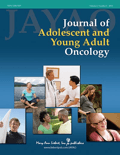
Journal of Adolescent and Young Adult Oncology
Championing Insights and Innovations in Young Adult Cancer CareThe Journal of Adolescent and Young Adult Oncology, published by MARY ANN LIEBERT, INC, is a premier peer-reviewed journal dedicated to enhancing the understanding and treatment of cancers in adolescents and young adults. With an ISSN of 2156-5333 and an E-ISSN of 2156-535X, this journal specializes in providing vital insights into the unique challenges faced by younger cancer patients, promoting research and clinical best practices in this underrepresented population. The journal features a commendable ranking in the Q2 quartile for Oncology and Q1 quartile for Pediatrics, Perinatology, and Child Health—highlighting its impact and relevance in both fields. Its Scopus rankings also reflect a strong standing; positioned at Rank #107/330 in Pediatrics and Rank #225/404 in Oncology. While the journal operates under a subscription-based model, it aims to disseminate crucial research findings and innovative treatments through its engaging content that serves as an invaluable resource for researchers, clinicians, and students alike. Since its inception in 2014, the journal has been at the forefront of addressing the pressing issues pertinent to young cancer patients, making it a vital outlet for groundbreaking studies and clinical advancements within this critical area of healthcare.
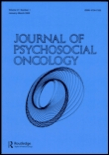
JOURNAL OF PSYCHOSOCIAL ONCOLOGY
Advancing understanding of cancer's emotional landscape.JOURNAL OF PSYCHOSOCIAL ONCOLOGY, published by Routledge Journals, Taylor & Francis Ltd, serves as a pivotal platform in the interdisciplinary field of psychosocial oncology, providing critical insights into the psychological, social, and emotional aspects impacting cancer patients and their families. With a storied history dating back to 1983 and converging until 2024, this journal holds a prestigious positioning, ranked in the Q2 category for Applied Psychology and Q3 for both Oncology and Psychiatry & Mental Health in 2023, highlighting its integral role in these overlapping fields. Despite not currently offering an open access model, the journal continues to attract a broad spectrum of scholars with its impactful research, evidenced by its Scopus rankings within the 50th to 58th percentile across related categories. Researchers, clinicians, and students alike will find the journal’s focus on the psychosocial dimensions of cancer to be invaluable, as it advances knowledge and practice aimed at improving patient outcomes and well-being in the cancer care continuum.
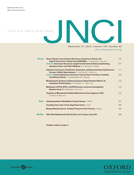
JNCI-Journal of the National Cancer Institute
Transforming cancer treatment with trusted knowledge.JNCI-Journal of the National Cancer Institute, published by Oxford University Press Inc. in the United Kingdom, is a premier journal dedicated to advancing the field of cancer research and oncology. With a distinguished history dating back to 1940, this journal has consistently maintained a strong reputation within the academic community, achieving a remarkable Q1 ranking in both Cancer Research and Oncology as of 2023. Researchers and practitioners rely on the JNCI for original research articles, review papers, and cutting-edge findings that impact clinical practices and therapeutic strategies. Although it does not currently offer open access, the journal remains a vital resource for academicians and healthcare professionals seeking to enhance their understanding of cancer mechanisms and treatment innovations. Its rigorous peer-review process ensures the publication of high-quality, credible research that meets the evolving challenges of cancer treatment and prevention through to 2024.

JOURNAL OF CANCER RESEARCH AND CLINICAL ONCOLOGY
Exploring Breakthroughs in Cancer Science and Patient Care.JOURNAL OF CANCER RESEARCH AND CLINICAL ONCOLOGY, published by Springer, is a prestigious peer-reviewed journal dedicated to advancing the fields of cancer research and clinical oncology. With an impact factor reflecting its significance within the academic community, the journal operates under a rigorous quality standard and offers a wealth of knowledge spanning from 1979 and continuing through 2025. With its comprehensive scope, it encompasses a wide array of topics including novel therapeutic strategies, clinical trials, and cutting-edge research methodologies, making it an essential resource for researchers, practitioners, and students alike. The journal’s category quartiles highlight its competitive edge, ranking Q2 in Cancer Research and Q1 in Medicine (miscellaneous) as of 2023. This positioning underscores its role at the forefront of oncology discourse. Through this journal, contributors and readers alike engage with impactful research that informs clinical practices and enhances patient care in oncology. Access to the journal’s content, although not open access, ensures curated and high-quality insights available to the academic and professional community.
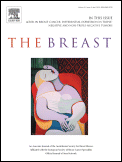
BREAST
Exploring breakthroughs in breast disease management.BREAST is a leading peer-reviewed journal dedicated to advancing knowledge and practice in the fields of cancer research, oncology, and surgery, published by Churchill Livingstone. With an impressive impact factor and a prestigious Q1 ranking in multiple categories including Cancer Research, Medicine, and Surgery, the journal consistently delivers high-quality content that informs and inspires researchers, clinicians, and educators. Since its transition to Open Access in 2020, BREAST has significantly expanded its reach, providing immediate and unrestricted access to pivotal studies and findings in breast health and disease management. With a history dating back to 1992 and converging to 2024, the journal serves as an essential resource for the latest developments and innovative approaches in the clinical and biomedical aspects of breast care. Scholars and professionals alike can explore a wealth of research aimed at improving patient outcomes and fostering scientific dialogue in this vital area of healthcare.
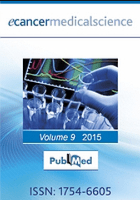
eCancerMedicalScience
Bridging research and practice in cancer care.eCancerMedicalScience, a leading open-access journal published by the eCancer Global Foundation, is dedicated to advancing the field of cancer research and oncology. With its inception in 2007, this esteemed journal has emerged as a pivotal platform for disseminating groundbreaking research, innovative treatments, and comprehensive reviews in the cancer domain. Based in the United Kingdom, eCancerMedicalScience has continuously contributed to the academic community with its rigorous peer-review process and broad-ranging scope, now encompassing topics from clinical oncology to molecular biology. Currently ranked in the Q3 quartile for both Cancer Research and Oncology in 2023, the journal provides a significant opportunity for researchers, professionals, and students to access valuable insights and share their findings within a global network. The commitment to open access ensures that knowledge is readily available, fostering collaborative efforts to combat cancer and improve patient outcomes.
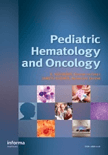
PEDIATRIC HEMATOLOGY AND ONCOLOGY
Advancing pediatric health through innovative research.Pediatric Hematology and Oncology, published by Taylor & Francis Inc, serves as a vital platform dedicated to the fields of hematology, oncology, and pediatrics, providing a comprehensive avenue for the dissemination of scholarly research and clinical advancements. With an ISSN of 0888-0018 and an E-ISSN of 1521-0669, this journal has successfully converged its expertise over the years from 1984 to 2024. Ranked in the Q3 category for Hematology and Oncology, alongside a Q2 ranking in Pediatrics, Perinatology, and Child Health (2023), it engages a diverse readership comprising researchers, healthcare professionals, and students eager to explore groundbreaking studies in child health and treatment methodologies. While it currently does not offer Open Access options, the journal is widely cited and recognized, particularly in its specialized fields, fostering a rich environment for dialogue and innovation in the management of pediatric hematological and oncological disorders. The journal is based in the United Kingdom at 530 Walnut Street, Ste 850, Philadelphia, PA 19106, making it an essential resource for those pursuing excellence in pediatric medical research.

BREAST CANCER RESEARCH AND TREATMENT
Innovating Research, Transforming TreatmentBreast Cancer Research and Treatment, published by Springer, stands as a pivotal journal within the domains of Cancer Research and Oncology, exemplified by its impressive Q2 and Q1 quartile rankings, respectively, in the 2023 category rankings. Since its inception in 1981, this journal has provided a vital platform for disseminating cutting-edge research focused on all aspects of breast cancer, ranging from molecular biology to treatment strategies. With an ISSN of 0167-6806 and E-ISSN of 1573-7217, it captures a broad audience of researchers, clinicians, and students dedicated to improving patient outcomes. The journal emphasizes high-quality, peer-reviewed studies that pave the way for advancements in therapy and direct novel insights into oncological practices. By maintaining a strong ranking in Scopus with percentile placements of 74th in Oncology and 61st in Cancer Research, Brest Cancer Research and Treatment continues to foster innovation and collaboration in the fight against breast cancer.
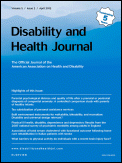
Disability and Health Journal
Connecting research and practice for better health outcomes.The Disability and Health Journal, published by Elsevier Science Inc, is a leading peer-reviewed platform that focuses on the interconnections between disability and health management. With its impact factor underscoring its significance at Q1 in both Medicine and Public Health, Environmental and Occupational Health, this journal stands out for its comprehensive analysis and dissemination of research covering the range of public health issues affecting individuals with disabilities. Spanning research from 2008 to 2024, it provides a rich collection of studies that aim to enhance understanding and improve practices in the field. As a reference for researchers, practitioners, and students alike, the journal promotes the sharing of innovations and evidence-based methodologies that advance disability studies. The journal operates under a traditional access model, allowing for a broad readership while maintaining high academic standards. With a Scopus rank of #78 out of 665 in its category, the Disability and Health Journal is essential for anyone seeking to contribute to or stay informed about major developments in disability and health research.

Cancer Control
Pioneering discoveries in cancer survivorship and care.Cancer Control is a prominent open-access journal published by SAGE Publications Inc, dedicated to advancing the field of oncology, hematology, and general medicine since its inception in 1995. With a focus on disseminating high-quality research, the journal contributes significantly to the knowledge base surrounding cancer prevention, treatment, and survivorship, making it a vital resource for researchers, healthcare professionals, and students alike. The journal currently holds a commendable position in the academic landscape, ranking in the Q2 category for both Hematology and Oncology, highlighting its impact and scholarly relevance. Available in an open-access format since 2018, Cancer Control ensures that critical findings are accessible to a broad audience, promoting collaboration and innovation in cancer-related research. Whether you're interested in the latest clinical trials, epidemiological studies, or public health initiatives, this journal serves as a key platform for sharing significant developments in cancer care and control.